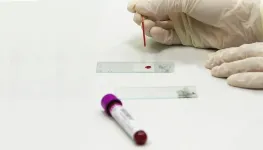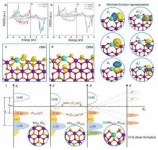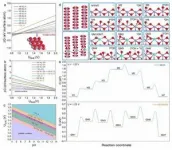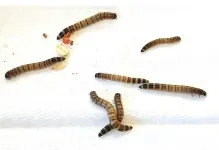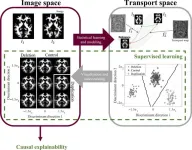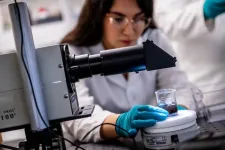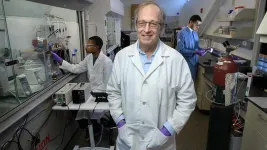(Press-News.org) Scientists are on the verge of a cancer breakthrough after working out how the body’s immune system targets cells devastated by the disease.
A new study has discovered that our natural killer cells, from the immune system which protect against disease and infections, instinctively recognise and attack a protein that drives cancer growth.
The experts say that by hijacking this protein, known as XPO1, they may be able to activate more killer cells to destroy the disease.
Scientists from the University of Southampton, working with experts worldwide, led the study and now believe it could offer new and less invasive forms of treatments.
The findings have been published in the Science Advances journal.
Lead author Professor of Hepatology Salim Khakoo, from Southampton, said it was previously believed that killer cells attack cancer cells in a random manner.
He added: “Our findings actually show how our body’s immune system recognises and attacks these cancer cells.
“Killer cells are an emerging form of immunotherapy that shows huge promise.
“They don’t attack healthy tissue in the way chemotherapy and other immunotherapies do, so are safer and have less side-effects than traditional forms of cancer treatment.”
The XPO1 protein examined by the scientists is essential for normal cell function.
However, in many cancers, it becomes overactive and allows malignant cells to multiply unchecked.
The Southampton scientists found that a peptide – short chains of amino acids – derived from the XPO1 protein attracted the natural killer cells.
This, they say, triggers the body’s immune response against the cancerous cells.
Prof Khakoo added: “Patients with cancer who had both active killer cells and high levels of XPO1 had significantly better survival rates.
“This holds true for a range of cancers including those with higher rates of death such as liver cancer, which has an average survival rate of only 18 months.
“As well as liver cancer, killer cell treatment in the future could be used to treat head and neck cancers, endometrial, bladder or breast cancer.”
Previous studies have linked natural killer cells to the body’s protection against cancer.
But the latest study is the first of its kind to highlight a viable technique of activating killer cells – to target the XPO1 protein – to fight the disease.
Co-author Professor Ralf Schittenhelm, from Monash University in Australia, said the discovery could change the course of immunotherapy.
“We hope it could lead to personalised cancer treatment, especially in cases where traditional therapies have failed.
“The potential to develop targeted therapies that utilise the body's own immune system is incredibly exciting."
The scientific team at Southampton are now working on the development of the world’s first vaccine that uses natural killer cells to fight cancer.
about the study in Science Advances at https://www.science.org/doi/10.1126/sciadv.ado6566.
ENDS
455 WORDS
END
Scientists discover how the body's killer cells attack cancer
Study finds that our natural killer cells instinctively recognise and attack a protein that drives cancer growth
2024-08-29
ELSE PRESS RELEASES FROM THIS DATE:
Interprofessional training in health sciences education has a lasting impact on practice
2024-08-29
Geriatrics experts have long known that collaboration is key to delivering quality, patient-centered care to older adults.
That’s why USC’s Interprofessional Education and Collaboration for Geriatrics (IECG) trains up to 150 students annually from seven health professions to teach the importance of teamwork in meeting the complex needs of the elderly.
Now, a study published in the Journal of Interprofessional Care highlights the long-term impact of IECG on USC health sciences graduates.
Researchers surveyed graduates one to three years after completing IECG to assess how the program influenced their practice. The findings were significant: 81% ...
Study reveals molecular mechanism behind MS and other autoimmune diseases
2024-08-28
New Haven, Conn. — More than two decades ago, a research team in the lab of David Hafler, a Yale researcher who at the time was at Harvard, discovered a type of T cell in humans that suppresses the immune system; they later found that these so-called regulatory T cells, when defective, are an underlying cause of autoimmune disease, specifically multiple sclerosis (MS). For many years, however, the mechanism behind this dysfunction has remained unclear.
In a new Yale-led study, a team of researchers finds that this loss of immune regulation is triggered by an increase in PRDM1-S, a protein involved in immune function, ...
To build a thriving electric vehicle market, prioritize equity and justice
2024-08-28
When it comes to purchasing and using electric vehicles (EVs), housing- and income-related factors significantly shape perceptions and preferences among potential buyers, finds a new study in Energy and Climate Change. This research, a collaboration between the Boston University Institute for Global Sustainability (IGS) and the U.S. Department of Energy’s National Renewable Energy Laboratory (NREL), is among the first to examine both EV adoption and charging infrastructure through an equity lens coupled with state-of-the-art original survey data.
Understanding the barriers to widespread EV adoption ...
Large language models can help detect social media bots — but can also make the problem worse
2024-08-28
An external study of Twitter in 2022 estimated that between a third and two thirds of accounts on the social media site were bots. And many of these automatons flooding social media are dispatched to sow political polarization, hate, misinformation, propaganda and scams. The ability to sift them out of the online crowds is vital for a safer, more humane (or at least more human) internet.
But the recent proliferation of large language models (known as "LLMs" for short), such as OpenAI’s ChatGPT and Meta’s Llama, ...
How beetle juice led to the discovery of a virus and solved the mystery of a superworm die-off
2024-08-28
Rutgers University-New Brunswick scientists have discovered a virus that caused a nationwide die-off of superworms, a common food for birds, reptiles, other pets and, more and more so, even for humans as an alternative protein source. In doing so, they pioneered a different way to search for and identify emerging viruses and pathogens in humans, plants and animals.
Using chopped up beetle carcasses forming a slurry and an electron microscope cooled by liquid nitrogen, the scientists reported today in Cell that they have discovered what they have titled Zophobas morio black wasting virus. The name is derived from ...
Leading computational scientist & oncology researcher Elana Fertig appointed new Director of the Institute for Genome Sciences
2024-08-28
University of Maryland School of Medicine (UMSOM) Dean Mark T. Gladwin, MD, announced today the appointment of Elana J. Fertig, PhD, FAIMBE, as the new Director of the School’s Institute for Genome Sciences (IGS). She is internationally-recognized for her work in integrating spatial multi-omics technologies with mathematical models to develop a new predictive medicine paradigm in cancer. Spatial technologies allow researchers to learn about any cell type inside of natural tissue, including gene activity ...
UVA research cracks the autism code, making the neurodivergent brain visible
2024-08-28
A multi-university research team co-led by University of Virginia engineering professor Gustavo K. Rohde has developed a system that can spot genetic markers of autism in brain images with 89 to 95% accuracy.
Their findings suggest doctors may one day see, classify and treat autism and related neurological conditions with this method, without having to rely on, or wait for, behavioral cues. And that means this truly personalized medicine could result in earlier interventions.
“Autism is traditionally diagnosed behaviorally but has a strong genetic basis. A genetics-first approach could ...
Marine engineering group to award ORNL researchers for innovative welding software
2024-08-28
Zhili Feng, a distinguished R&D staff member, and Jian Chen, a senior R&D staff member, in Materials Science and Technology Division at the Department of Energy’s Oak Ridge National Laboratory, will receive the Elmer L. Hann Award at the Society of Naval Architects and Maritime Engineers, or SNAME, Convention on Oct. 15 in Norfolk, Virginia. SNAME plays a crucial role in promoting excellence in marine engineering and naval architecture, supporting professionals through education, research and collaboration.
The award is presented to authors of the best paper on ship production delivered at a SNAME event. In September 2023, Feng and Chen presented “Develop ...
UBC engineers develop all-in-one solution to catch and destroy ‘forever chemicals’
2024-08-28
Chemical engineers at the University of British Columbia have developed a new treatment that traps and treats PFAS substances—widely known as “forever chemicals”—in a single, integrated system.
Per- and polyfluoroalkyl substances (PFAS) are widely used in manufacturing consumer goods like waterproof clothing due to their resistance to heat, water and stains. However, they are also pollutants, often ending up in surface and groundwater worldwide, where they have been linked to cancer, liver damage and ...
Purdue researchers take inspiration from viruses to improve delivery of nucleic acid-based therapies to cancer cells
2024-08-28
WEST LAFAYETTE, Ind. — A researcher in Purdue University’s College of Science is developing a patent-pending platform technology that mimics the dual-layer structure of viruses to deliver nucleic acid (NA)-based therapies to targeted cancer cells.
David Thompson leads a team developing the carrier system called LENN. He is a professor in the James Tarpo Jr. and Margaret Tarpo Department of Chemistry and on the faculty of the Purdue Institute for Cancer Research and the Purdue ...
LAST 30 PRESS RELEASES:
New knowledge on heritability paves the way for better treatment of people with chronic inflammatory bowel disease
Under the Lens: Microbiologists Nicola Holden and Gil Domingue weigh in on the raw milk debate
Science reveals why you can’t resist a snack – even when you’re full
Kidney cancer study finds belzutifan plus pembrolizumab post-surgery helps patients at high risk for relapse stay cancer-free longer
Alkali cation effects in electrochemical carbon dioxide reduction
Test platforms for charging wireless cars now fit on a bench
$3 million NIH grant funds national study of Medicare Advantage’s benefit expansion into social supports
Amplified Sciences achieves CAP accreditation for cutting-edge diagnostic lab
Fred Hutch announces 12 recipients of the annual Harold M. Weintraub Graduate Student Award
Native forest litter helps rebuild soil life in post-mining landscapes
Mountain soils in arid regions may emit more greenhouse gas as climate shifts, new study finds
Pairing biochar with other soil amendments could unlock stronger gains in soil health
Why do we get a skip in our step when we’re happy? Thank dopamine
UC Irvine scientists uncover cellular mechanism behind muscle repair
Platform to map living brain noninvasively takes next big step
Stress-testing the Cascadia Subduction Zone reveals variability that could impact how earthquakes spread
We may be underestimating the true carbon cost of northern wildfires
Blood test predicts which bladder cancer patients may safely skip surgery
Kennesaw State's Vijay Anand honored as National Academy of Inventors Senior Member
Recovery from whaling reveals the role of age in Humpback reproduction
Can the canny tick help prevent disease like MS and cancer?
Newcomer children show lower rates of emergency department use for non‑urgent conditions, study finds
Cognitive and neuropsychiatric function in former American football players
From trash to climate tech: rubber gloves find new life as carbon capturers materials
A step towards needed treatments for hantaviruses in new molecular map
Boys are more motivated, while girls are more compassionate?
Study identifies opposing roles for IL6 and IL6R in long-term mortality
AI accurately spots medical disorder from privacy-conscious hand images
Transient Pauli blocking for broadband ultrafast optical switching
Political polarization can spur CO2 emissions, stymie climate action
[Press-News.org] Scientists discover how the body's killer cells attack cancerStudy finds that our natural killer cells instinctively recognise and attack a protein that drives cancer growth
